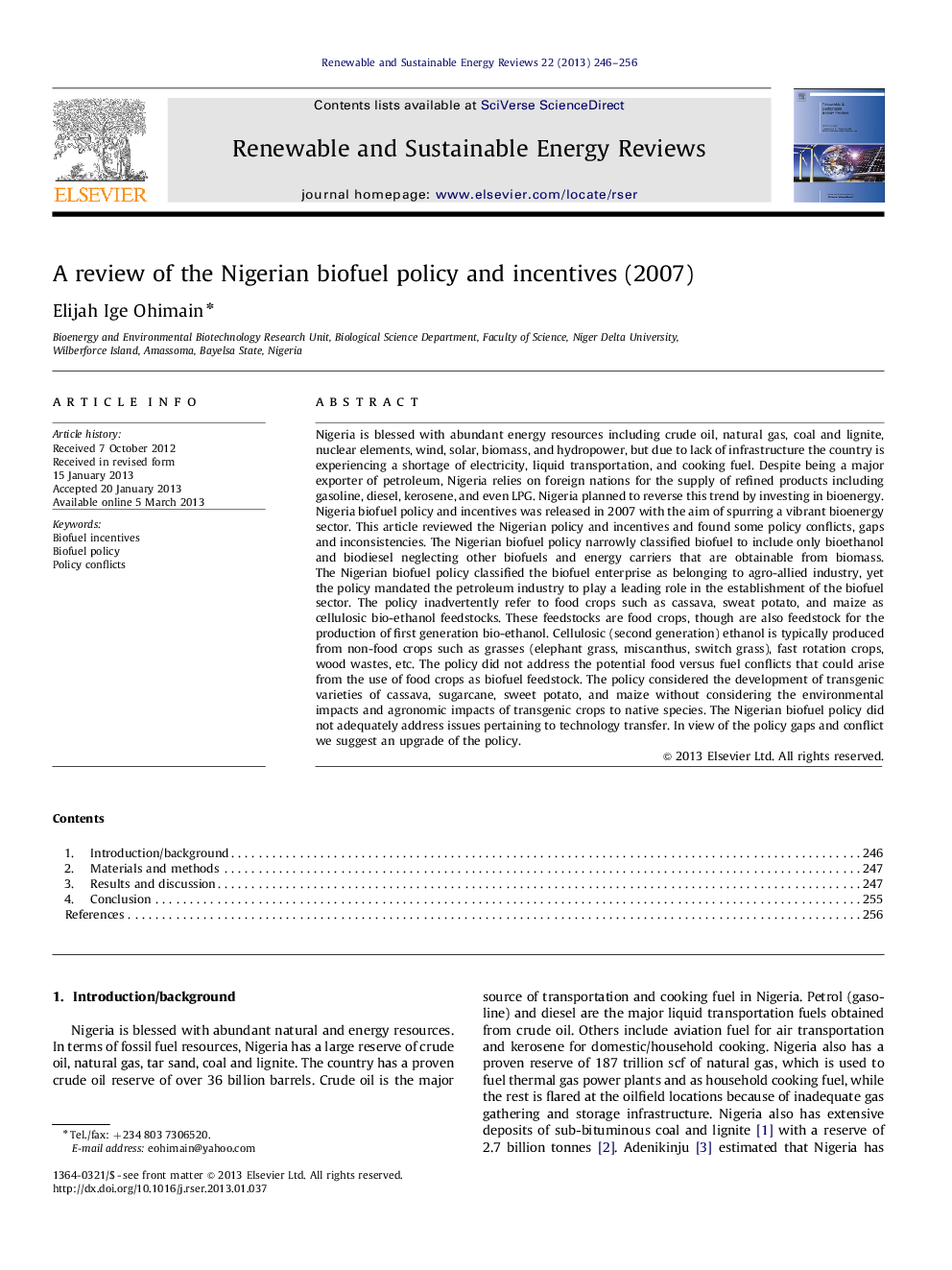| کد مقاله | کد نشریه | سال انتشار | مقاله انگلیسی | نسخه تمام متن |
|---|---|---|---|---|
| 8122038 | 1522363 | 2013 | 11 صفحه PDF | دانلود رایگان |
عنوان انگلیسی مقاله ISI
A review of the Nigerian biofuel policy and incentives (2007)
ترجمه فارسی عنوان
بررسی سیاست و انگیزه های سوخت زیستی نیجریه (2007)
دانلود مقاله + سفارش ترجمه
دانلود مقاله ISI انگلیسی
رایگان برای ایرانیان
کلمات کلیدی
انگیزه های سوخت زیستی، سیاست سوخت زیستی، اختلافات سیاسی،
ترجمه چکیده
نیجریه با منابع انرژی فراوان از جمله نفت خام، گاز طبیعی، زغالسنگ و سنگ قیمتی، عناصر هسته ای، باد، خورشید، زیست توده و انرژی آبی برخوردار است، اما به دلیل کمبود زیرساخت ها کشور کمبود برق، حمل و نقل مایع و پخت و پز را تجربه می کند سوخت نیجریه با وجود صادر کننده اصلی نفت، نیجریه برای تامین محصولات تصفیه شده از جمله بنزین، دیزل، نفت سفید و حتی گازوئیل، به کشورهای خارجی متکی است. نیجریه برنامه ریزی کرده است که این روند را با سرمایه گذاری در انرژی زیستی متوقف کند. سیاست و انگیزه های سوخت زیستی نیجریه در سال 2007 به منظور تحریک بخش انرژی پر جنب و جوش منتشر شد. این مقاله سیاست و انگیزه های نیجریه را مرور کرد و برخی از اختلافات سیاسی، شکاف ها و ناسازگاری ها را کشف کرد. سیاست سوخت زیستی نیجریه به طور ضوابطی سوخت زیستی را دسته بندی می کند تا فقط بیوتکنول و بیودیزل را نادیده بگیرد و سایر سوخت های زیستی و انرژی های موجود را که از زیست توده قابل دسترسی هستند، نادیده بگیرد. سیاست زیستی سوخت نیجریه، زغال سنگ را به عنوان صنایع وابسته به صنایع وابسته به زغال سنگ طبقه بندی کرد، با این حال، این سیاست، صنعت نفت را مجبور کرد نقش مهمی در ایجاد بخش سوخت زیستی ایفا کند. این سیاست به طور غیرمستقیم به مواد غذایی مانند گوجه فرنگی، سیب زمینی عرق و ذرت به عنوان مواد زیستی اتانول سلولزی اشاره دارد. این مواد اولیه محصولات غذایی هستند، هرچند که برای تولید نسل اول زیستی اتانول نیز مواد اولیه هستند. سلولز (نسل دوم) اتانول به طور معمول از محصولات غیر غذایی مانند گیاهان (چمن فیل، میسکانتوس، چمن سوئیچ)، محصولات چرخشی سریع، زباله های چوب و غیره تولید می شود. این سیاست در مورد منازعات غذایی بالقوه در مقابل حملات سوختی که ممکن است بوجود آید از استفاده از محصولات مواد غذایی به عنوان سوخت زیستی مواد اولیه. این سیاست، توسعه گونه های ترانس ژنیک گوجه فرنگی، نیشکر، سیب زمینی شیرین و ذرت را بدون توجه به اثرات زیست محیطی و اثرات زراعی محصولات زراعی به گونه های بومی محسوب می کند. سیاست زیستی سوخت نیجریه به مسائل مربوط به انتقال فن آوری به طور کامل پاسخ نمی دهد. با توجه به شکاف و اختلافات سیاست، پیشنهاد می کنیم ارتقاء این سیاست را پیشنهاد دهیم.
موضوعات مرتبط
مهندسی و علوم پایه
مهندسی انرژی
انرژی های تجدید پذیر، توسعه پایدار و محیط زیست
چکیده انگلیسی
Nigeria is blessed with abundant energy resources including crude oil, natural gas, coal and lignite, nuclear elements, wind, solar, biomass, and hydropower, but due to lack of infrastructure the country is experiencing a shortage of electricity, liquid transportation, and cooking fuel. Despite being a major exporter of petroleum, Nigeria relies on foreign nations for the supply of refined products including gasoline, diesel, kerosene, and even LPG. Nigeria planned to reverse this trend by investing in bioenergy. Nigeria biofuel policy and incentives was released in 2007 with the aim of spurring a vibrant bioenergy sector. This article reviewed the Nigerian policy and incentives and found some policy conflicts, gaps and inconsistencies. The Nigerian biofuel policy narrowly classified biofuel to include only bioethanol and biodiesel neglecting other biofuels and energy carriers that are obtainable from biomass. The Nigerian biofuel policy classified the biofuel enterprise as belonging to agro-allied industry, yet the policy mandated the petroleum industry to play a leading role in the establishment of the biofuel sector. The policy inadvertently refer to food crops such as cassava, sweat potato, and maize as cellulosic bio-ethanol feedstocks. These feedstocks are food crops, though are also feedstock for the production of first generation bio-ethanol. Cellulosic (second generation) ethanol is typically produced from non-food crops such as grasses (elephant grass, miscanthus, switch grass), fast rotation crops, wood wastes, etc. The policy did not address the potential food versus fuel conflicts that could arise from the use of food crops as biofuel feedstock. The policy considered the development of transgenic varieties of cassava, sugarcane, sweet potato, and maize without considering the environmental impacts and agronomic impacts of transgenic crops to native species. The Nigerian biofuel policy did not adequately address issues pertaining to technology transfer. In view of the policy gaps and conflict we suggest an upgrade of the policy.
ناشر
Database: Elsevier - ScienceDirect (ساینس دایرکت)
Journal: Renewable and Sustainable Energy Reviews - Volume 22, June 2013, Pages 246-256
Journal: Renewable and Sustainable Energy Reviews - Volume 22, June 2013, Pages 246-256
نویسندگان
Elijah Ige Ohimain,
